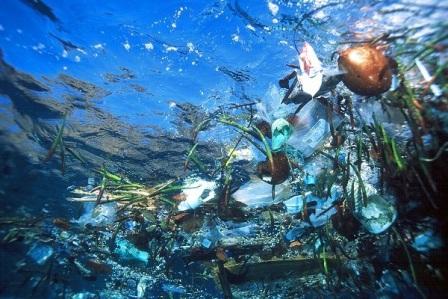/regions/political
Political
Workshop on Financial Management & Social Accountability for Non profit & Charitable organisations, Visthar, 2nd to 6th May, 2011, Bangalore
Posted on 28 Jan, 2011 05:26 PMOrganizer: Visthar, Bangalore
Venue: Visthar, Bangalore
Description:
Visthar, Bangalore has been facilitating this workshop for the past three years and this has been well attended and well received among NGOs, Civil Service Orgnisations(CSOs) and other Charitable Orgnisations(COs).
Our Oceans - A plastic soup - Earth Institute
Posted on 28 Jan, 2011 05:07 PM Photo credit: cesarharada.com
Photo credit: cesarharada.com
Ensuring sustainable drinking water security in rural areas - PIB Release
Posted on 28 Jan, 2011 04:40 PM Hitherto the role of the government was that of a service provider, with minimum involvement of the community in the planning process and the implementation activities. With the increase in demand due to public aspirations and decrease of availability of safe water it was considered essential to involve the community in the programme.
To achieve this, there was a paradigm shift and the Framework for implementation of National Rural Drinking Water Programme was revised in 2009. The Department appropriately addressed the soft issues related to facilitating the active participation of PRIs in the process of planning, implementation and operation of schemes to achieve the goal of long term sustainability. It also ensured that the community gets continuous support and handholding so that they are empowered to take up the role of planning and implementing the systems also in addition to operating and maintaining them.
Eradication of manual scavenging - Recent PIB Releases
Posted on 28 Jan, 2011 04:17 PM The Union Minister of Social Justice & Empowerment Shri Mukul Wasnik recently inaugurated the two-day Consultation Meeting on Eradication of Manual Scavenging and Rehabilitation of Manual Scavengers.Speaking on the occasion, he called upon the States to work towards eradicating the shameful practice of manual scavenging by the end of the 11th plan. He regretted that despite various efforts made by the Central Government and the States, the practice of manual scavenging still exist in some parts of the country. The meeting was organized by the Ministries of Social Justice & Empowerment, Urban Poverty Alleviation and Urban Development.
Shri Wasnik said that we must address rehabilitation of manual scavengers to our utmost capacity.
Draft strategic plan 2010-2022, for rural drinking water
Posted on 28 Jan, 2011 03:49 PMForwarded to the portal by: Sujoy Majumdar, DDWS through the
Using media to address water issue in Rajasthan - Video Volunteers
Posted on 28 Jan, 2011 12:00 PMDuring her yearlong stay, Tara trained at least twenty people into video production some of whom have succeeded in finding work in the local market as photographers, cameramen and wedding video makers. In this blog she gives a vivid account of the CVU, its producers and their work.
Zero Waste Management Event on Sunday, Green Path ECO, 30th Jan 2011, Bangalore
Posted on 28 Jan, 2011 11:14 AMOrganizer: The Green Path ECO Foundation
Venue: The Green Path ECO Hotel, Bangalore
Events:
- Film show
- Presentation
- Skit by children
- Followed by discussion and hands on experience
Regenerating natural resources and rural livelihoods in rainfed areas of India: A civil society consultation by WASSAN to discuss priorities for the twelfth five year plan
Posted on 26 Jan, 2011 09:13 PM A civil society consultation was held on “Regenerating natural resources and rural livelihoods in rainfed areas of India” by WASSAN at Hyderabad in December 2010 to discuss priorities for the twelfth five year plan. The Planning Commission, Government of India has been steering the process of development in India by conceptualizing five year plans and had sought inputs from civil society organizations, activists groups, networks of CBOs / NGOs, donors and others for preparing an approach paper for twelfth plan.
A civil society consultation was held on “Regenerating natural resources and rural livelihoods in rainfed areas of India” by WASSAN at Hyderabad in December 2010 to discuss priorities for the twelfth five year plan. The Planning Commission, Government of India has been steering the process of development in India by conceptualizing five year plans and had sought inputs from civil society organizations, activists groups, networks of CBOs / NGOs, donors and others for preparing an approach paper for twelfth plan.
The objective of the consultation workshop was to contribute to the process of defining broad contours of twelfth plan with a focus on rural livelihoods the thrust area being policy framework, funding support, institutional arrangements etc., by -
- Consolidating the lessons from good practices in promoting and protecting rural livelihoods in the country, that could be integrated in twelfth five year plan.
- Systematically articulating issues and concerns (bottlenecks) in promoting and protecting rural livelihoods, which could be addressed in the twelfth five year plan.
National Conference on Contexual changes in Indian Slums – A Critical Analysis, 17th - 18th April 2011, Kadapa
Posted on 25 Jan, 2011 05:07 PMOrganizer: Voluntary Initiative Services In Our Neighbourhood
Venue: Kadapa
Description:
India's urban population is increasing at a much faster rate than its total population. India will have 41 percent of its population living in cities and towns by 2030 from the present 28 percent. According to Registrar General of India there are 81 million urban poor in India. Nearly 49,000 slums continue to blight the urban landscape forcing lakhs of people to live in pathetic conditions.
Annual International Water Convention, India Water Forum (IWF) 2011, 13th - 15th April 2011, New Delhi
Posted on 25 Jan, 2011 01:25 PMOrganizer: The Energy and Resources Institute (TERI)
Venue: India Habitat Centre, New Delhi
Theme:
- Water Security and Climate Change: Challenges and Opportunities